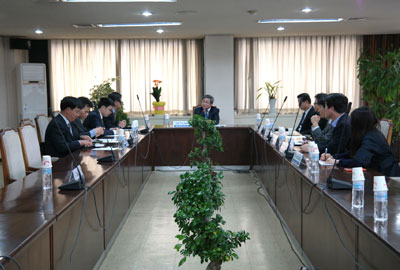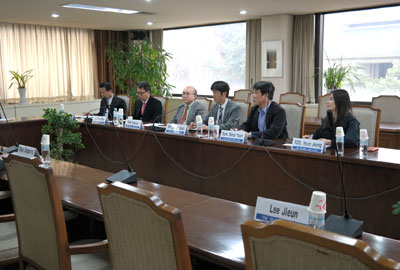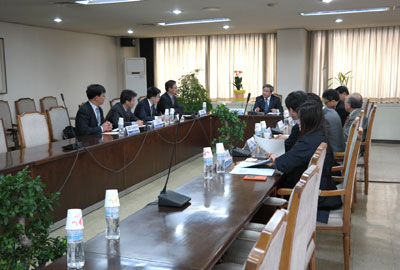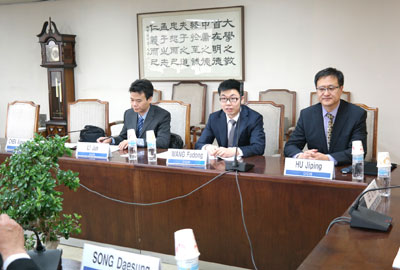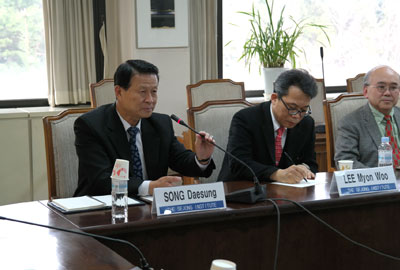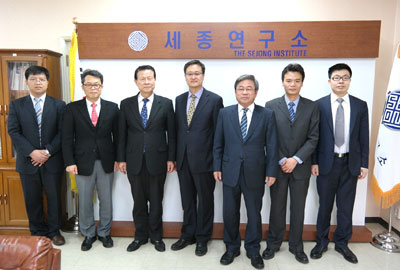On March 28, 2014, the Sejong Institute held its second Round Table with experts from the China Institutes of Contemporary International Relations (CICIR) on the subject of the security environment in Northeast Asia and the Korean Peninsula. The discussion was moderated by research fellow Tai Hwan Lee and participated by Sejong research fellows including President Daesung Song and CICIR Vice President and three experts from the Department of the Korean Peninsula.
Participants exchanged their views on the following subjects.
*South Korea: Opinions of the Sejong Fellows
*China: Opinions of the CICIR Fellows
1. North Korea’s Domestic Politics
-According to CICIR, North Korea has been fairly secure since the purge of Jang Song-taek, and there seems no anti-Kim Jong-Un force within the regime. The economy is also getting better, but long-term growth remains questionable.
2. North Korea’s Simultaneous Development of Economy and Nuclear
-According to CICIR, although simultaneous development of economy and nuclear is impossible from general perspective, North Korea has been adhering to the Pyongjin Nosun.
-South Korea does not see the Pyongjin Nosun would succeed, and has offered a ‘big-deal,’ large-scale economic aid in return for giving up on its nuclear ambitions. The Park Geun-hye Administration has also proposed to provide economic aid if the North agrees to give up on its nuclear program. However, the majority opinion say that denuclearization of the North would not come easily because of loans.
3. The Possibility of North Korea’s Economic Reform and Opening-up
-According to views of South Korea, the economy of North Korea is less likely to recover, and marketization process is accelerating under such collapsing economy. China sees a slight chance for North Korea’s reform and opening-up, however, unlike China, North Korea’s lack of capitals and a leadership figure, capable of carrying out reform and opening-up, are making the slight chance difficult to become realized.
4. Assessment of North Korea’s Nuclear Capability
-According to China, North Korea has already succeeded in downsizing its nuclear arsenals and therefore no need to carry out another nuclear experiment. However as North Korea has not obtained skills needed for missiles to re-enter, it is still in the process.
-According to South Korea, North Korea succeeded in downsizing the nuclear arsenals in the past recent years, and has the capability to load missiles.
5. The Possibility and Necessity of the Six Party Talks Resumption
-According to South Korea, there is less chance of persuading North Korea to give up its nuclear ambitions, therefore, it seeks other ways to change the North Korean regime, disable the nuclear program, and bring in unification of the Korean Peninsula. Denuclearization of North Korea requires more substantial plans.
-China says, although there exist different views (between North Korea and the U.S.), denuclearization of the North requires more than persuasions.
6. Unification of the Korean Peninsula
-China supports President Park’s unification initiative, and expects to discuss about unification issues and cooperate. However, at the moment, priority lies on denuclearizing North Korea than the unification of the Korean Peninsula.
-However, South Korea believes that there needs substantial preparations besides aids, in order to bring in unification.
7. The Future of the China-Japan Relations
-According to the views of China, responsibility for the worsening China-Japan relations lies on Japan. The current tensions between the two countries will continue. The conflicts will remain unresolved even after the resignation of the Abe Administration due to the deep distrust in Japan. The China-Japan relations needs trilateral talks with South Korea.

